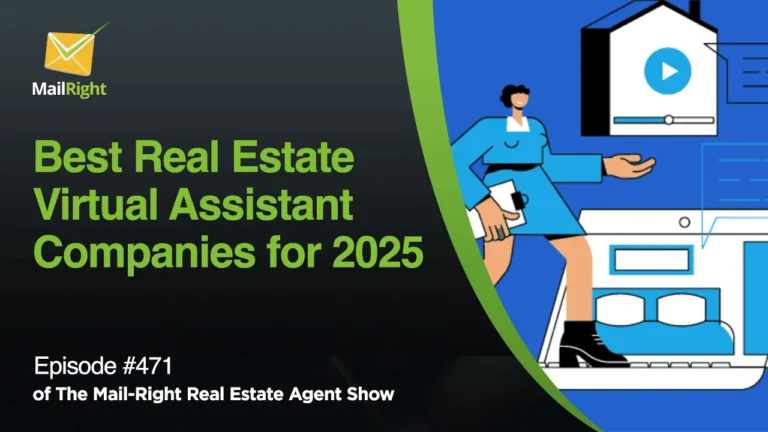The Mail Right Show Episode 284: Importance of Resolving the Issue of Lead Data Ownership Rights
In the 284th episode of the Mail-Right Show, John and Robert featured Christopher Anuszewski, the Vice President of Operations for The Figueroa Team. His competence lies in applying his technical talents to undertake in-depth analysis and identifying possibilities to streamline corporate operations to improve client service and scale the organization. With his extensive expertise in web development, project management, information technology infrastructures, CRM administration, sales, customer support, and the legal profession, Chris was invited to speak on the show for the third time to discuss the top real estate agent CRMs and the importance of resolving the issue of lead data ownership rights.
Lead Data Ownership Rights
When an agent starts his career, his broker will provide him with a complimentary CRM. KV Core has grown in popularity and its vigorous marketing to brokers, who can then offer it to their agents at a subsidized rate. However, there is a catch: if the agent leaves the agency despite having signed an agreement, he will be penalized for utilizing the brokers’ CRM. What exactly does this imply? The agency owns that data, not the agent, even though he inserted it and generated all those leads; the agency retains ownership of it.
When the agent requests their client data in layman’s terms, the agency could withhold or limit the information an agent gets. Client data you can get may include a lead’s basic information, such as name, email address, and phone number. However, the phone conversations, activity, schedule, and other notes provided by the agent, which constitute the critical portion of the CRM’s data, cannot be exported. Therefore, when he logs into a new CRM, whatever it is, he loses all his previous data and has to start from scratch. He’s not even sure if this is an active, hot lead that’s ready to move in the next 90 days, and he spoke with them yesterday, or if it’s a lead he hasn’t spoken to within four months, and it’s time for him to follow up.
Now, what’s the root of all of these? Chris stated that this is a result of the terms of service and user agreements they accepted upon joining the platform. The statement effectively means that the agency owns anything these agents enter into their platform; that is standard practice, so technically, it is lawful. These agents may hold the data, but not the platform, and because they are merely adding to it, the agency has the legal right to do whatever they want with it. Thus, when the agents begin to push back, they are helpless; they have no recourse. Therefore, no court, no legal action, and threats could make a difference because they signed a contract acknowledging their understanding of the platform’s existence.
Major Concern For Realtors
Several teams are not bothered about data ownership rights issue, which is paradoxical given that these teams frequently turnover and fail. They are not taking into account the data’s total long-term value in the first place. They can conduct a post-sale process utilizing this data. Now, what is this, and how significant is it? It is the maintenance of the relationship between the seller and the buyer established throughout the selling process. It is where Chris truly shines since he nurtures leads who he has worked with in the past.
According to Chris, managing lead data from a CRM is a critical part of any business. Whenever he acquires a new sales contact, they are automatically enrolled in a custom-tailored email nurturing program. Chris utilizes this program to stay in touch with them and nurture the relationship. This allows him to improve his influence with that person and in part allows him to grow his sphere of influence substantially.
As the lead matures he gains more information from them and tracks all of this into his CRM. This effectively enables him to maintain his connections and have highly personalized follow-up messages for his leads. With that being said, it is critical to hold and secure one’s database.
That is why Chris emphasized that all agents should be aware of these data ownership rights before using these systems. He advises realtors to conduct due diligence before committing their heart, soul, money, and data to a single platform. It is because it is their data that will help them manage their client relationships for future transactions. They should ask themselves first, “Am I going to grow out of this?” Because if they outgrow it, they’ll be forced to restart with a new CRM, which can be difficult. When they have a hundred leads, that’s acceptable; however, when they have 5,000 leads but no notes or activities to accompany them, this can be frustrating and impossible to manage.
Possible Workaround
When he encountered a similar issue while attempting to move from BoomTown to Follow Up Boss, where he immediately obtained a solution from Follow Up Boss specialists, who stated that one must contact support as the account’s administrator or owner, he must say that they are conducting some external data analysis. To undertake data analysis, one requires a data analyst on their team. Additionally, he stated that one should never declare they are quitting the CRM, as this will bind them. They have to say that they required a deep export, which ensures that all the data needed by another party is included.
Following that, they just had to play a cat and mouse game, which entails performing data analysis through a secondary system inaccessible to BoomTown. Additionally, he stated that they must thoroughly rehearse the process to ensure a successful transition. I highly recommend you watch the video yourself to learn more about this workaround which can help you especially if you find yourself in a similar situation.





